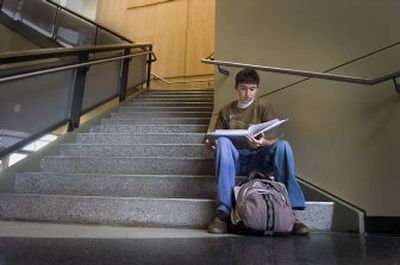Running Start gives high-schoolers a leg up

In this graduation season, Bryson Toth had more commencements on the calendar than most.
Toth earned both a high school diploma and an associate’s degree this spring. He’ll enroll in college with a two-year head start, paid for by the state.
It wasn’t easy, but “I’m glad I did it,” Toth said. “If you really apply yourself, you can do it.”
Toth is one of 84 graduating high school seniors who earned full AA degrees through the Community Colleges of Spokane this spring as part of the state’s Running Start program. For the last two years, he’s been enrolled simultaneously at Central Valley High School and Spokane Community College.
The double graduates represent a small portion of Running Start, Washington’s booming early-college program. About a tenth of the state’s high school juniors and seniors now take college credits, tuition-free, through the program. Since it began in 1992, Running Start has grown from roughly 3,300 participants to 16,540 in 2005-06.
All 50 states participate in some form of dual enrollment, and 40 have programs governed by state policy such as Running Start. The programs offer several benefits, supporters say, from the savings to parents and taxpayers, to an improved alignment between the K-12 and college systems.
In Idaho, colleges and universities each develop their own approach to dual enrollment, and the state doesn’t pay for the credits. Idaho officials recently agreed on a uniform fee for dual enrollment – $65 per credit – that is a step toward a coordinated approach.
“Our program has been small, simply because our faculty has been very cautious that what we’re putting out there is meeting the expectation that these are rigorous, university-level courses,” said Cynthia Leonhart, associate registrar for summer and dual enrollment at the University of Idaho.
Between 200 and 300 high school students a year enroll for credit at the university, she said. At North Idaho College, 338 students were in the dual-enrollment program, a sharp increase from 182 five years ago.
By contrast, nearly 1,000 students participated in Running Start at SCC and Spokane Falls Community College in 2005-06. Slightly more participated in programs run by EWU, either on campus or through high schools.
Most students use the program to pick up some credits in advance of college. Only about 5 percent actually wrap up an AA degree, and doing so can require a level of commitment that concerns some educators and parents.
They worry some students can get in over their heads in the tougher courses and self-directed atmosphere of college, and that could hurt their ability to get into the college of their choice. They also worry about the move for social reasons – some Running Start students complete their high school requirements early and attend college almost exclusively during their junior and senior years.
Toth feels he managed to skirt those difficulties. His college GPA, at 3.8, is slightly better than his high school one, and he said after he ran into trouble in one math class he learned to recognize when to ask for help.
“These college classes move twice as fast, maybe even three times as fast, as most high school classes,” he said.
While taking courses at SCC, Toth sang in Central Valley’s jazz choir, acted the role of the Cowardly Lion in CV’s production of “The Wizard of Oz” and attended his prom. He also played in an acoustic rock band.
“I still got the high school experience,” he said. “I went to my graduation, went to the senior all-nighter – I did all those things.”
Some students just don’t want the high school experience – at least not the one that can seem comprised only of social cliques and the rule of popularity.
Katie Fracz, 18, graduated from East Valley High School and SCC last week. For her, one of the biggest advantages of Running Start was the fact that it reduced her high school experience. She only went to high school for the quarterly meetings with a counselor required by the program.
“I liked it a lot,” she said. “I took all my classes at SCC.”
She plans to attend EWU in the fall.
As for academic performance, state surveys show that Running Start students have comparable GPAs to traditional community college students. A review at the University of Washington showed an average GPA of 3.12 for former Running Start students, according to a state report.